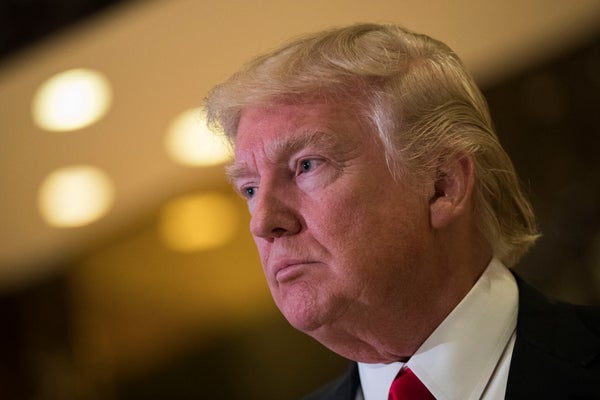Scientists are hoarding data on global temperatures, in case President-elect Donald Trump tries to wipe it off government Web sites or block public access to it. Ahead of Trump’s inauguration the U.S. Department of Energy (DoE) has released stricter guidelines to protect scientists from government interference, and for many it feels like that safety net could not have come soon enough.
Welcome to what many call Trump’s post-fact presidency. Studies and evidence do not seem to sway him, but climate change remains a stubborn thorn in his side. Apparently determined to portray scientific conclusions as liberal bias, even declaring climate change a Chinese conspiracy, he has tapped climate science deniers for roles intended to protect the environment. He has consulted with an anti-vaccine activist on the safety of vaccinations, and he has alarmed the scientific community by attempting to single out individual climate change experts. Here are five of the major moves many see as hostile toward science—and as sobering indicators of the world the scientific community could be facing after January 20:
Trump’s pick for head of the U.S. Environmental Protection Agency has actively battled its mission
To lead the EPA, Trump appointed Scott Pruitt, the Oklahoma attorney general who has long opposed environmental regulations and has questioned the science behind climate change. His LinkedIn profile decries the EPA’s “activist agenda” and he is in the process of suing the agency—for the 13th time. This time it is over Pres. Barack Obama’s signature environmental policy, the Clean Power Plan, which aims to reduce greenhouse gas emissions from electricity production.
On supporting science journalism
If you're enjoying this article, consider supporting our award-winning journalism by subscribing. By purchasing a subscription you are helping to ensure the future of impactful stories about the discoveries and ideas shaping our world today.
He chose former Texas Gov. Rick Perry for Energy Secretary
The DoE designs and maintains the weapons in the U.S. nuclear arsenal, and works to ensure they do not fall into enemy hands. The outgoing energy secretary, Ernest Moniz, is a Massachusetts Institute of Technology physicist, who replaced a Stanford University physicist, who was appointed by Obama to succeed an MIT chemical engineer. It is a science-heavy department, and one that Perry—who is not a scientist—had advocated dismantling during his 2012 presidential bid. Although Perry greatly expanded wind power in Texas during his governorship, he is a climate change skeptic.
He chose an energy company executive for secretary of State
Trump tapped former ExxonMobil Chief Executive Rex Tillerson for Secretary of State. Tillerson stands out among other cabinet nominees because he acknowledges that climate change is a problem. Exxon, however, has been accused of hiding climate change research from its shareholders for years. Tillerson denies this.
He met with a vaccine critic while planning a commission on autism
Robert Kennedy, Jr., said Trump asked him to chair a vaccination safety panel. Trump’s team corrected that, saying they are considering forming an autism commission but have not made final decisions about it. Kennedy has repeatedly promoted discredited arguments that link vaccines to autism. Trump himself has tweeted that there are “many cases” of children who become autistic after receiving vaccinations.
His transition team sought information about Energy Department staff associated with climate change
In December Trump’s team asked the DoE for the names of employees who have worked on issues related to climate change. The department refused, and the team backed down.
